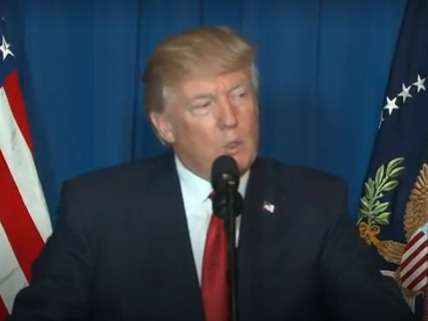Former Obama Lawyers Are Suddenly Worried About Illegal Wars
Unlike his predecessor, Trump has not even done us the courtesy of coming up with a laughable excuse.

Yesterday an anti-Trump group called United to Protect Democracy filed a Freedom of Information Act lawsuit aimed at finding out something you really shouldn't need a FOIA lawsuit to find out: the president's legal rationale for lobbing cruise missiles at a Syrian air base last month. The lawsuit seeks "any and all records, including but not limited to emails and memoranda, reflecting, discussing, or otherwise relating to the April 6, 2017 military strike on Syria and/or the President's legal authority to launch such a strike."
To be clear: We know why Trump bombed Syria—because he was upset by images of children and other innocent civilians dying from the government's April 4 sarin gas attack on a rebel-held town. What we don't know is why Trump, who in 2013 argued that "Obama needs Congressional approval" to attack Syria as punishment for President Bashar al-Assad's use of chemical weapons, thought he had the legal authority to do the same thing, assuming he gave the issue any thought at all.
On April 10, the FOIA lawsuit notes, White House Press Secretary Sean Spicer "claimed that the Constitution gives the President 'the full authority to act' whenever military force is 'in the national interest.'" In addition to the humanitarian concerns raised by Assad's use of chemical weapons, Spicer mentioned the threat posed by ISIS, which is fighting the Assad regime. That same day, Secretary of State Rex Tillerson said the missile assault was all about "holding to account any and all who commit crimes against the innocents anywhere in the world"—a breathtakingly broad justification for military action.
The following day, Defense Secretary James Mattis said: "Our military policy in Syria has not changed. Our priority remains the defeat of ISIS." He said the attack on the Syrian air base was the best way "deter the regime" from using chemical weapons, which are prohibited by an international agreement to which Syria is a party.
None of those explanations amounts to a legal rationale for the U.S. attack. The Chemical Weapons Convention does not authorize signatories to enforce its provisions through unilateral military action, and the U.S. Constitution requires the president to obtain congressional authorization for acts of war unless the country is under attack.
Trump is hardly the first president to ignore the latter rule. Describing "a split between the apparent intent of the Constitution and how the country has been governed in practice," New York Times reporter Charlie Savage notes that "presidents of both parties have a long history of carrying out military operations without authorization from Congress." That emphatically includes Barack Obama, who famously argued that bombing Libyan leader Moammar Gadhafi's forces did not constitute "hostilities" under the War Powers Act and justified his unauthorized war against ISIS by citing congressional approval of a different war against a different enemy.
I am not sure which is worse: insulting our intelligence with such transparently inadequate rationales or dispensing with the pretense of legality altogether, as Trump has done. But the members of United to Protect Democracy, former Obama administration lawyers who for all we know had a hand in crafting the 44th president's laughable excuses for illegal military interventions, seem considerably more perturbed about presidential overreach now that Trump is commander in chief.
"We have seen an unprecedented tide of authoritarian-style politics sweep the country that is fundamentally at odds with the Bill of Rights, the constitutional limitations on the role of the President, and the laws and unwritten norms that prevent overreach and abuse of power," the group says. "The only limits to prevent a slide away from our democratic traditions will be those that are imposed by the Courts, Congress, and the American people." Those limits are not strengthened by selective application.


Show Comments (17)